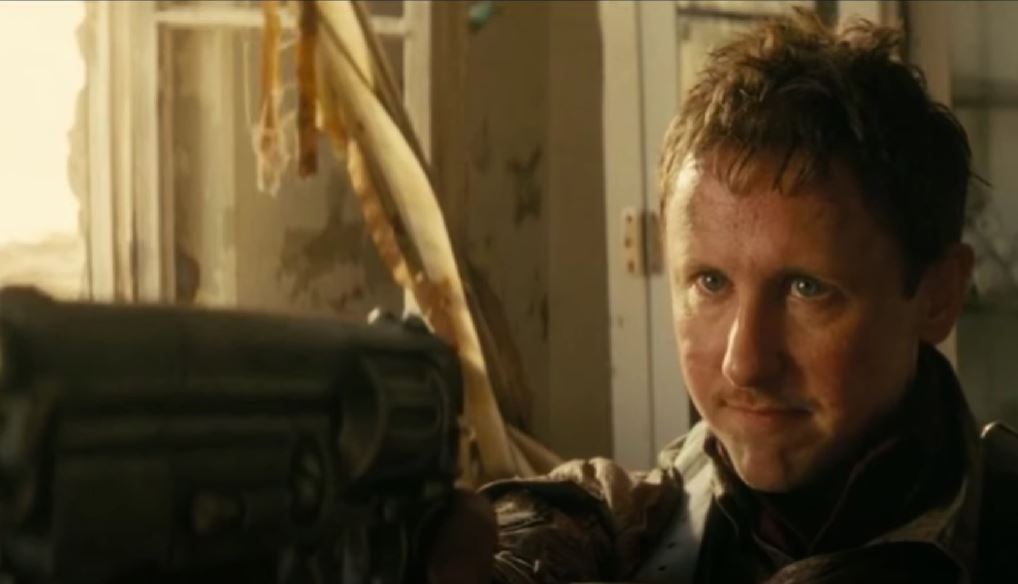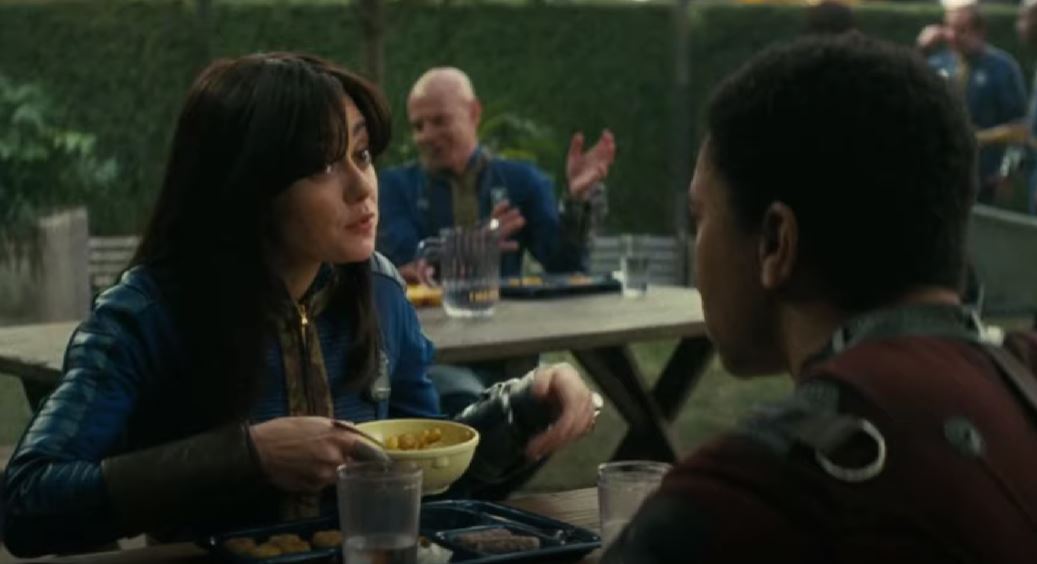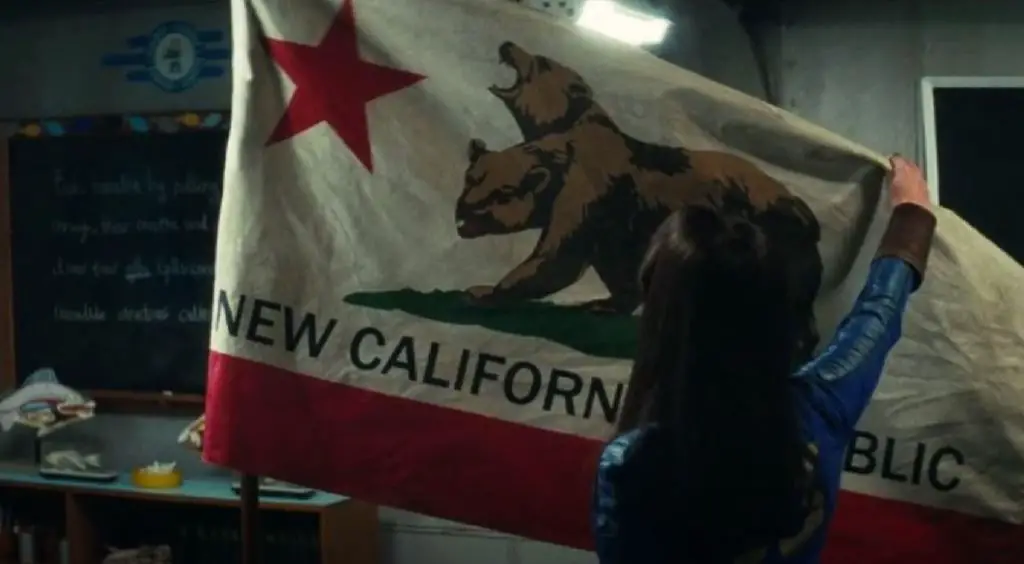Welcome back to our continuing review series for the first season of Fallout. And it has been excellent so far, with episode 5 shifting the plot into gear as the season begins winding to a close. This week’s episodes, titled “The Trap” and “The Radio,” immediately pick up on that momentum as they move everyone into position for the season finale and introduce all the major players, complete with an intriguing Vault adventure along the way.
Let’s get to it, because these episodes are a kick in the head.

The biggest overall reveals Fallout unveils throughout these episodes tend to center around Cooper Howard/The Ghoul, and his life pre-War. We finally learn more about Moldaver, who turns out to have also been alive in the pre-War world and can’t explain her continued survival through being a ghoul, and through her the show drops some sinister hints about Vault-Tec’s designs upon the world.
“The Trap,” in particular, introduces pre-War Moldaver as a scientist who worked on cold fusion technology before Vault-Tec bought out the companies funding her so they could bury the technology, leaving her as a prominent activist against their increasing monopoly and influence over the United States. Her argument to Coop about Vault-Tec’s financial interest in wanting nuclear war are arguably the most explicit critique of capitalism of the season.
It’s also completely true. Vault-Tec poured a relentless amount of resources into the building of the Vaults. Their entire business model centers around fear of nuclear war and selling protection to the world around them. They cornered the market on the apocalypse, and as such would want to promote tension between warring countries so that they can continue to sell fear of nuclear annihilation.
Cooper recognizes his wife’s own increasingly strange behavior and seeming certainty of war, which is why Moldaver is able to persuade him to take the listening device to spy on Barb.
“The Radio” opens with the Ghoul questioning a family (while relishing in the fear humans have of ghouls) about Moldaver’s whereabouts, and you’re left wondering what happened back before his mutation that would make him seek her out.
We’ve known since the very first game that the stated purpose of the Vaults was to keep their residents safe until the fallout (yeah yeah) of nuclear war faded and they could safely emerge to restart society. All subsequent games have hammered home that the Vaults also had their own sick “experiments” of the human condition. Vault-Tec has always been an understated villain of the Fallout series, and it’s interesting to see this show double down on that.
Lucy’s adventure in Vault 4 were a fascinating subversion of audience expectations that also drove home Vault-Tec’s immorality alongside Coop’s scenes. Anyone who has played a Fallout game has inevitably come upon a Vault and uncovered whatever disturbing secrets lay inside. “The Trap” recreated this feeling excellently; everything Lucy sees and hears is designed to convince both her and the audience that something terrible is happening, and that she shouldn’t trust the creature comforts being provided.
“The Trap” ending with her finding a way into the level 12 lab and discovering the sick experiments within just confirms what we all increasingly expected. Here was a Vault full of mutated people, she comes across a lab seemingly built to mutate people, surely Vault 4 and its residents are evil, right?
Then the “The Radio” comes along and turns the whole concept on its head. Making Vault 4’s current residents into survivors who overthrew the immoral experiments done upon wastelanders by the original Vault scientists was a terrific twist, and one that worked to Fallout’s benefits on numerous levels.
(It also smacks of something right out of Bioshock, which I loved.)
So far this season, Lucy’s challenges have been largely physical. She has learned to survive the bodily threats of the world outside of Vaults, where every person and place holds a potential danger to her possessions and/or livelihood. Vault 4, however, was more of an emotional challenge, one tearing apart the very foundations of her upbringing. The Vaults were a safe haven, where people could be safe and live without fear, protected by the planning and benevolence of the good people at Vault-Tec. Even the innocence-shattering attack from the first episode was the fault of the outside world.
Like she says when they first arrive at Vault 4, she and Maximus were now in the best place in the world.

Vault 4 ends up teaching her the exact opposite lesson here. The original residents of the Vault were the villains, and the wastelanders were the heroes. Vault 4 was a sick, unrestrained nightmare, where immoral people had free reign to do what they wanted, without oversight or regulation. Vault-Tec were not the saviors that Lucy has believed of them throughout her entire life. Even if she chalks it up to an outlier, the doubt is planted in her head.
That being said, her paranoia made total sense, as did Maximus’s complete lack of it. Maximus is easily seduced by the creature comforts because the dangers of the world are old hat, and mutations are nothing worth noting or panicking over. To him, the things that make Lucy paranoid are unremarkable. Meanwhile, Lucy only knows Vault life one way, and cannot look at the weirdness around her without being suspicious.
Add the strange Moldaver cult orgy thing happening and, well, of course Lucy was suspicious. She had just nearly lost her own Vault to raiders posing as Vault dwellers.
The realization that she was wrong is a moment of recalibration after 6 episodes that have taught her to distrust everything. She almost loses her way, but in the end she is the same Lucy, the bright do-gooder convincing Maximus to return Vault 4’s fusion core, making his power armor useless.
Maximus takes a while to come into his own, but these are the episodes where I began to really like him. You can see the influence Lucy has had on him; it’s not just the fusion core moment, or him deciding to rescue Lucy at the expense of a comfortable place to live and hide from the Brotherhood. It’s not just that he helps Thaddeus run or lets Lucy take the real head. You can see he has had a shift in his priorities in life, and Lucy has played a significant role.
Willingly returning to the Brotherhood, knowing he has a fake head and will likely be killed, is the kind of selfless act you would have never seen from the same character who let Titus die earlier in the season. But then, that’s the difference between a role model like Titus and a role model like Lucy.
I wonder if this moment will have a similar effect on Thaddeus. Obviously Thaddeus’s mutation already makes him dead on sight the second the Brotherhood finds out about it, but you can say the same of Maximus. Thaddeus already expressed regret for his actions and the toxic influence of the Brotherhood, and this second chance at life may also prove to be another ripple effect of Lucy entering the Wasteland.
I’ve said it before, but this is what defines a Fallout game, and has defined the Fallout show as well, in stunningly faithful fashion. The main character is such a fierce force of nature on the status quo of their individual Wastelands. It extends beyond their direct interactions with focused side characters, and into the ripples spreading outwards as other characters follow their example, for better or worse.

Hell, you can see it with her brother, Norm, back in Vault 33. He begins the season with open, smug apathy towards everything in his life, but you cannot tell me that his inspiration to get to the bottom of the Vault 31 mystery is not inspired by Lucy’s courage in leaving the Vault to find their father.
The Vault 31-32-33 mystery is arguably the best running plotline throughout the season, and I love how Norm develops into this unconventional type of hero, working in the shadows to uncover the conspiracy of whatever experiment his Vaults are running. It’s another major strength of this show; each main hero represents a different type of Fallout protagonist, like you’re watching different SPECIAL builds.
Norm’s resourcefulness is so reminiscent of his sister while also showing itself in a different way, and I imagine he will have the same impact on the society around him that Lucy is.
But we’ll have to wait until next week, and my recap of the finale, to see where all of this leads. The pieces are all in place, and Fallout has done a terrific job positioning them. It’s been one heck of a season of television, and one that (spoilers) results in my favorite video game adaptation to date. The nukes really hit the fan in the finale and I can’t wait to talk about it next week.
Fun Tidbits:
So, do we really think Thaddeus is turning into a ghoul? I can’t remember that transformation happening this quickly, or with some weird injection. The most popular contrarian theory is that this was the FEV virus turning him into a super mutant, and I fully agree.
Fred Armisen’s DJ Carl felt like it was ripped straight out of Portlandia, and this is in no way a complaint.
CX404 is officially the latest Dogmeat! It was only a matter of time but I was sitting here impatiently until it happened. Also, it’s really hard for me to forgive Thaddeus for locking her up in the Nuka-Cola fridge.
Steph being the new Overseer of Vault 32 feels like a recipe for conflict with Vault 33. She openly harbors ill will towards 33 leadership for what happened to her husband, and that they’re letting the raiders live.
The two severed heads “kissing” while Lucy and Maximus kiss was really peak Fallout humor. Bravo.
Norm hacking the computer was straight out of the games. Every Pip-Boy/computer screen has pretty much been the game screens overlaid onto the props, and I appreciate that so much.
Lucy Goosey is so stupid in the absolute best way.
I admit that after the Shady Sands controversy in the fifth episode, seeing NCR armor in the opening of “The Radio” hyped me, and I was a little bitter to see it was just farmers that scavenged it.
How did I not even mention Matthew Berry through all of this?! He makes everything he’s in ten times better, and I like that he was made an actual character to explain the Mr. Handy voice. Plus he gets a top-tier speech about late-stage capitalism? Give this scene all the awards.
I also got this far without mentioning Maximus’s unhealthy, sex-ed-less view of orgasms. Look, do I understand why people would be upset to see the Brotherhood turned into virgin idiots? I guess, but it’s so entertaining.
I don’t think there’s a moment more visually disturbing throughout this first season of Fallout than the woman giving birth to the baby Gulpers that proceed to eat her.
Images Courtesy of Amazon
Have strong thoughts about this piece you need to share? Or maybe there’s something else on your mind you’re wanting to talk about with fellow Fandomentals? Head on over to our Community server to join in the conversation!

